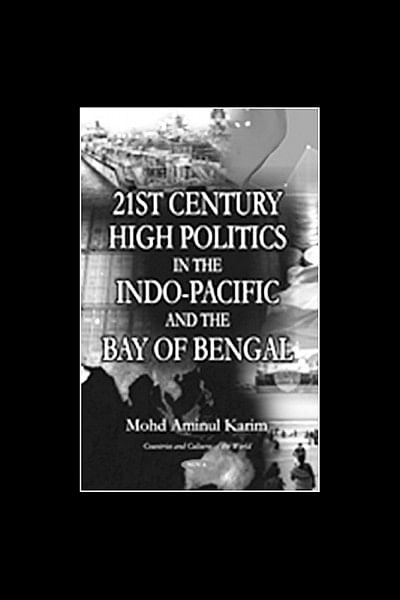21st Century High Politics in the Indo-Pacific and the Bay of Bengal

Mohd Aminul Karim, Nova Science Publishers, Inc, New York, 2017, ISBN: 978-1-53610-881-1
A post-cold war international economic and political order is still unfolding and has been witnessing concerted attempts by traditional and emerging global and regional powers to reshape geopolitics across the globe and dictate international relations. Relatively smaller nation-states are also endeavoring to rediscover their potentials, redefine their roles and reassert their importance in the global stage. The primary purpose of these attempts by every nation, big or small, is to sustain its economic development and have it cushioned by a firm security environment. The shifting balance of power and geo-political reconfigurations will undoubtedly have a far-reaching impact on 21st century global politics and economics. Obviously, this has become a 'hot topic' for academic discourse.
Mohd Aminul Karim's 21st Century High Politics in the Indo-Pacific and the Bay of Bengal is a successful attempt to bring to the fore the importance of the countries of the Asia-Pacific and Bay of Bengal regions and the maritime communication network of these regions in advancing global economic development and political stability. An analysis through regional economic cooperation and strategic and security collaboration of the prospects of accelerated economic growth and the social development of the Indo-Pacific and Bay of Bengal region countries, including Bangladesh, has been provided in the book.
Although this aspect of the book has not been explicitly captured in its title, it focuses more on the economics, in particular commerce and international trade, of the nations of the Indo-Pacific region than politics per se. The work is a unique mesh of cutting-edge concepts, emerging political realities and unfolding economic potentials encapsulated into an innovative strategic direction for countries of the region to consider for furtherance of their economic development and national security. Lt. General (ret.) Karim has aptly argued for the importance and relevance of application of some traditional and modern concepts, strategies and theories, which are infrequently used in political and economic literature, for a prudent analysis of geopolitics.
Having clarified the concepts of region and sub-region and relevant theoretical issues in chapters 1, 2 and 3 of the book, Karim turns to deal with current and emerging compulsions, medium and long-term economic goals and the political ambitions of various powers, primarily USA, China and India within the Indo-Pacific and Bay of Bengal regions in chapters 5 and 6. Chapter 4 focuses on perhaps the most important initiative of this era—the attempt through China's leadership to integrate Asian economies with Africa and Europe – the Belt and Road Initiative (BRI). To his credit, Karim has dedicated all of chapter 7 to Bangladesh, outlining in it its maritime strategy and potential to leverage the 'blue economy' of Bay of Bengal region to its benefit. In doing so, he has rightly elevated Bangladesh's position in the regional and in global arenas.
In chapters 8 & 9 the author presents an in-depth analysis of the long-term interests and objectives of major powers like USA, China, Japan, India and Australia of the Indo-Pacific and Bay of Bengal regions, and of they have reoriented their foreign policies to respond to their emerging geo-strategic interests. Of particular interest is Professor Karim's analysis of how the relatively smaller powers of the Indo-Pacific region such as Pakistan, Myanmar, Vietnam, Bangladesh and others are maneuvering within emerging complex geopolitical alignments to pursue their respective economic and political goals. The significance of Pakistani-Chinese strategic relations and the acrimonious state of China-India relations has been well amplified in the discussion on the emerging features of the Indo-Pacific region.
The book pinpoints US interests in the stability of the Indo-Pacific region and the safety of its sea-lanes, highlighting in the process the importance of the Strait of Malacca through which twenty-five percent of world's traded goods and sea-borne oil passes. Powerful global players like the USA, China and Japan have also found a new frontier in South China Sea to demonstrate their kind of '21st century high politics'. Dr. Karim explains in his book why and how this game of power politics can potentially destabilize regional and global security arrangements and adversely affect the economic and social development of nations.
Karim's work is a significant and a novel addition to the existing body of knowledge about the rapidly growing importance and contribution of the Indo-Pacific and Bay of Bengal regions to the global economy and security of nations. 21st Century High Politics in the Indo-Pacific and the Bay of Bengal can, indeed, serve as a valuable resource book for both students and instructors of advanced International Relations and Political Science. Academics; researchers, political scientists and journalist covering regional and global politics will surely benefit immensely from the analysis and conclusions presented in the book. Foreign policy strategists and national-level politicians will also be able to draw on the information and analyses in the book in formulating their policies.
The reviewer is an Adjunct Faculty at Independent University, Bangladesh, Dhaka

 For all latest news, follow The Daily Star's Google News channel.
For all latest news, follow The Daily Star's Google News channel. 



Comments